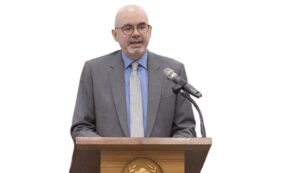US support for the island is “unwavering, principled and bipartisan”, top US envoy says
On Wednesday, the senior US ambassador to Taiwan said that Washington would keep up its promises to guarantee Taiwan’s ability to defend itself against Chinese threats, calling American support for the island “rock-solid, principled, and bipartisan.”

Raymond F. Greene made his comments on Wednesday in the midst of wars in the Middle East and Ukraine that might further ensnare the US, as well as ambiguity about China’s intentions toward the island it claims as its own territory and may use force to retake.
Taiwan was clearly a high issue for Greene, particularly the safety of commerce via the vital Taiwan Strait that separates the island from China.
After formal diplomatic relations with Taiwan were broken in 1979 when Washington normalized relations with the Communist government in Beijing, Greene stated that the US would “continue to maintain the capacity to resist any resort to force or other forms of coercion against Taiwan,” citing the Taiwan Relations Act as proof of this.
According to Greene, the Executive Branch has reported to Congress almost $38.4 billion in foreign military sales to Taiwan since 2010, of which over $6.4 billion occurred under the Biden administration. Additionally, there have been transfers of armaments from US stockpiles totaling $345 million.
Along with the arrival or impending delivery of new and upgraded F-16 jet fighters, Abrams tanks, and other equipment, Taiwan is also increasing the amount of armaments produced domestically, including submarines, anti-landing missiles, and ground-to-air missiles.
Senior US diplomat Greene became America’s de facto ambassador on the 23.5 million-person island that has long maintained close political, economic, and cultural ties to the US when he arrived two months ago to take up his role as director of the American Institute in Taiwan.
When US National Security Adviser Jake Sullivan visited China last week, he focused mostly on Taiwan in an effort to maintain open lines of communication in a relationship that has become more strained in recent years.
Sullivan spoke with Chinese leader Xi Jinping, Foreign Minister Wang Yi, and a senior general from the Central Military Commission on his first visit to China as President Joe Biden’s primary national security advisor.
The meeting between Sullivan and Xi was significant, according to Danny Russell, a vice president at the Asia Society Policy Institute in New York and former member of the Obama administration’s national security council. This was because Sullivan was perceived by the Chinese leadership as “a direct extension” of the US president, and Sullivan’s statements were perceived as “coming straight from (President Joe) Biden.”
In an uncommon encounter with a visiting US official, Sullivan also met Gen. Zhang Youxia, one of China’s vice chairmen of the Central Military Commission, last week.
A statement from the Chinese Defense Ministry said, “China demands that the United States stop military collusion between the US and Taiwan, stop arming Taiwan, and stop spreading false narratives about Taiwan,” without going into detail about what the false narratives were.
The two had “acknowledged the progress in sustained, regular military-military communications over the past 10 months,” according to a White House statement. Regarding Taiwan, the US statement just said that Sullivan brought up the need of peace and stability across the Taiwan Strait.
Following a visit to Taiwan in August 2022 by prominent US congresswoman and House Speaker Nancy Pelosi, China cut off contact between the two armed forces. It took over a year for talks to recommence after Xi and Biden met in November outside of San Francisco.
In sharp contrast to China’s autocratic regime, Taiwan’s vibrant democracy has long had the support of the US. Greene, nevertheless, said that Washington will not address the charges of corruption and power abuse that have surrounded former Taipei mayor and presidential contender Ko Wen-je in recent months.